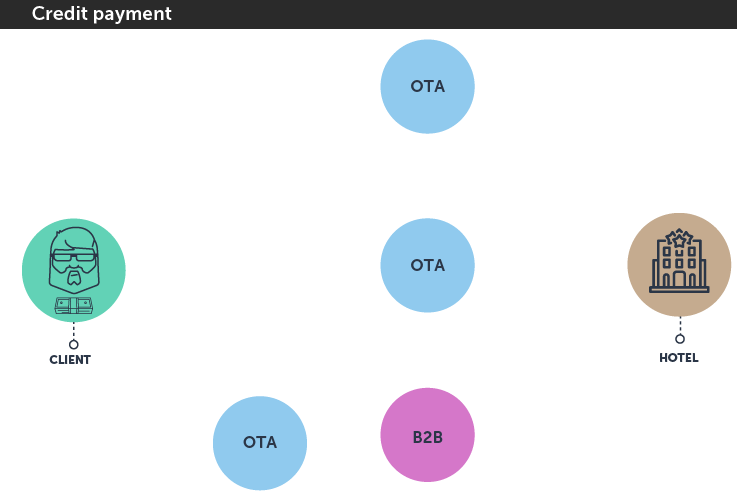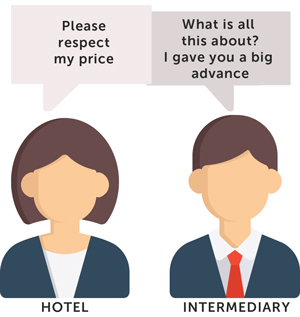In this post, we will be talking about an issue known by many yet still unresolved, currently having come no closer to a solution. Price disparity is the main problem for many hotels and correcting this situation is essential in order to outline a correct direct-sales strategy.
What is price disparity?
Finding a price for your hotel on the Internet lower than what you authorised. It could be a markup not applied correctly or an retail price on which they are reducing part of their commission.
Do price disparities hurt me?
No, unless you are worried about the final price your hotel is sold at, what type of client sleeps in it and that your website and Booking.com are selling everything that they can.
Otherwise, yes. The reasons are:
- Unfair treatment. Price disparities benefit channels who pay on credit and damage those who pay directly, which ends up penalising you.
- They bring in clients who aren’t part of the target clients you are interested in. A client who pays 100€ is not the same as a client who pays 85€.
- You portray an image of lack of control in prices, just like a Turkish bazaar.
- It precludes the creation of a customer-loyalty programme since you no longer have the best price.
- It makes you believe that certain channels provide value (because they generate bookings) when in fact it’s not that way, since most of what they sell comes from price disparities.
- It distorts your revenue-management work since you are varying prices without having the certainty of how much of this price change actually reaches the client.
- It has a hugely negative impact on your direct sales: Why would clients book on your website if there are lower rates out there that are easier to find?
- It generally drives towards lower profitability for your hotel, since the channels that give you the worst levels of profit are, at the same time, those which have more margin to create price disparities. Therefore, the channels which interest you the least will sell more than those that interest you the most (such as the direct one).
Are price disparities legal?
In many countries like in Spain, a distributor can fix the retail price, reducing his profit margin if necessary, in the interest of free competition and to the benefit of the final consumer. In other words, a producer (whether he is selling hotel rooms or tomatoes), no matter how much it pains him, cannot impose the retail price of his product to a distributor.
If you have contracts signed with your distributors in which there is a binding price acceptance and they do not comply with it, it’s quite simply a breach of contract. Legal or not, the contract that you have signed is worthless.
What no law requires is to work with all of the market’s distributors. You have freedom to choose the channels with which you want to work. Work by yourself and choose those who exclusively comply with your criteria. The rest, leave them out.
When do price disparities occur?
Unlike what some people think:
- It has nothing to do with having contracts with net prices. Price disparities exist in net prices but also in BARs (best available rates), where the hotel fixes the retail price and pays out a commission for each booking.
- Price disparities can also not be avoided by having all the channels connected to the channel manager.
Price disparities may occur at the same time that there is a credit payment, in other words, when there is NO direct payment from the final client to the hotel.
By not controlling the payment, there is no way that you can know for sure which price the final client paid to the last one in line in the chain, which is usually an OTA with which you don’t have a contract. You also don’t know the details of the successive payments which take place until they reach you. All that you know is that you cash in the agreed net rate or BAR minus the agreed commission.
Which channels generate price disparities?
The only channels that DON’T generate price disparities are those that work with direct payment from the client to the hotel. Out of the OTAs with a sales volume, the only ones are Booking.com and Expedia, only in their direct payment mode (“hotel collect”).
The rest of channels may generate price disparities and you should therefore check them at all times.
Why do some OTAs and bed banks generate price disparities?
As of today, almost all online channels compete for the same clients. Different studies carried out recently show that clients compare up to 25 websites before making a purchase.
The sad truth of it all is that most OTAs/bed banks cannot compete in price parity with Booking.com (the undisputed number 1) and the hotel’s own website.
These OTAs and bed banks come across the decision of either not selling much or “playing with price disparities”. In numbers, it would be like going from selling 1 room night and making 20 euros in profit to, having lowered the price by 8 euros, selling 5 room nights and making 12 euros in profit for each. In total, we are talking about making 60 euros in profit instead of 20 euros. At the end of the day, it’s not big business but it’s business nevertheless.
Let’s remember that the first thing that distributors must do is cover their fixed costs and for that they need a scale (volume) to dilute their fixed costs among many room nights. First of all, it’s about “not losing” and then it’s about “making some profit”, but the second part may arrive via sales deals or having a stronger negotiating power for the following year. When a channel reaches this point, we know how it’s going to end up in the short-to-mid term. We have witnessed many resounding bankruptcies in the last few years.
Is it related to having market rates with tour operators?
Absolutely. If you still have market rates, it’s highly probable that you have a serious price-disparity problem. There are two reasons for this:
- The channel with the best price (in theory limited to a single market) can easily distribute it on the Internet (are there any borders on the Internet?) to any other market.
- The remainder of OTAs and bed banks, facing the situation of not having the best price in certain markets, will reduce their profit margin in order to be competitive.
Is this something new or has it always existed?
Before the arrival of the Internet, the hotel had barely any control over its hotel’s retail price through distribution contracts since direct payment was the minority option. Each tour operator/agency fixed it according to their criteria and, sometimes, according to the issuing market. The fact that this happens in the offline world is not a problem because clients are more controlled and, in order to access different rates, they have to physically move, something improbable on a large scale.
However, there is a problem now with the arrival of the Internet because, in just a few minutes, your client can access different prices for your hotel, which you don’t control or authorise (in the online world, at least).
Do the deposits that some channels pay me have any effect?
They shouldn’t, but they do. The fact that a channel pays a deposit in advance should not allow them to generate price disparities. Nevertheless, this is a regular occurrence. In fact, to make a payment in advance is a tactic many channels employ to ensure a future sales volume (the classic win-win situation for tour operators), although it doesn’t make much sense in the world of online sales. In order to achieve those sales levels, they must regularly resort to price disparities.
What do affiliates have to do with all of this?
Bed banks are not B2C but rather B2B channels, which means that they actually re-distribute your rooms to other channels who are B2C (OTAs or physical agencies). OTAs like Booking.com or Expedia also have their affiliation network, to which they re-distribute your rooms and rates in the online world.
To make things more complicated, there are not always two levels in the chain but often more. One sale could take place in the following scheme: B2B2B2B2C, where the channel with which you have a contract sells the room to a bed bank, who then sells it to a receptor, who then sells it to an OTA (among the thousands which exist), who finally sells to the final client. In a chain of 4-5 steps, controlling payments and amounts is quite simply impossible.
Without doubt, affiliation networks are, due to their opacity, one of the most important black spots in the world of price disparities.
Who is to blame for price disparities: the one who generates it (affiliate) or the one who allows it (the channel with which you have a contract)?
It is very common that the channel with which you have a contract blames the affiliate who generated the sale. They are partly right (they cannot know the price that the client paid) but the truth is that it is their responsibility to control their affiliates, so there cannot be any excuses. If they cannot control them, conclude sales with them and that’s the end of it. There’s not much more to say.
Therefore, the fact that a channel systematically generates price disparities through affiliation is entirely the channel’s fault.
Which types of price disparities are there?
Intermediation is certainly highly innovative on this topic and it applies increasingly sophisticated ways to generate price disparities. We will analyse them in this other post.
How do I control my hotel’s price disparities? When I achieve it, which results should I expect?
It requires the implementation of an internal procedure, perseverance and determination. We analyse the key points as well as their results in another post.
Conclusion
In online distribution, controlling the price of your rooms is vital and the first step to take if you want to empower your direct channel. It’s the first subject you need to pass. Without it, everything that you do afterwards (investments in marketing, chatbots or social networks) will have a much lower effect. It’s like wanting to get a university degree without having been to primary school.
Many hotels have understood this reality and have got the ball rolling with excellent results. However, there are still many others where intermediation is still fixing the prices with complete impunity, maintaining artificial sales levels that make you believe that they are providing you with value when that’s not the case. The ball is in your court to get your hands dirty and correct this or accept it and move on, but at least let it be an informed decision.








